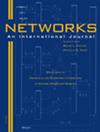Distributionally risk‐receptive and risk‐averse network interdiction problems with general ambiguity set
IF 1.3
4区 计算机科学
Q4 COMPUTER SCIENCE, HARDWARE & ARCHITECTURE
引用次数: 1
Abstract
We introduce generalizations of stochastic network interdiction problem with distributional ambiguity. Specifically, we consider a distributionally risk‐averse (or robust) network interdiction problem (DRA‐NIP) and a distributionally risk‐receptive network interdiction problem (DRR‐NIP) where a leader maximizes a follower's minimal expected objective value for either the worst‐case or the best‐case, respectively, probability distribution belonging to ambiguity set (a set of distributions). The DRA‐NIP arises in applications where a risk‐averse leader interdicts a follower to cause delays in their supply convoy. In contrast, the DRR‐NIP provides network vulnerability analysis where a network‐user seeks to identify vulnerabilities in the network against potential disruptions by an adversary (or leader) who is receptive to risk for improving the expected objective values. We present finitely convergent algorithms for solving DRA‐NIP and DRR‐NIP with a general ambiguity set. To evaluate their performance, we provide results of our extensive computational experiments performed on instances known for (risk‐neutral) stochastic NIP.具有一般模糊集的分布式风险接受性和风险厌恶性网络拦截问题
引入了具有分布模糊性的随机网络拦截问题的推广。具体来说,我们考虑了一个分布式风险厌恶(或鲁棒性)网络拦截问题(DRA‐NIP)和一个分布式风险接受网络拦截问题(DRR‐NIP),其中领导者分别在最坏情况或最佳情况下最大化追随者的最小期望目制值,概率分布属于模糊集(一组分布)。DRA - NIP出现在风险规避领导者拦截追随者以导致其供应车队延迟的应用中。相比之下,DRR - NIP提供网络漏洞分析,网络用户寻求识别网络中的漏洞,以防止对手(或领导者)的潜在破坏,这些对手(或领导者)愿意接受风险,以提高预期的客观价值。给出了具有一般模糊集的DRA - NIP和DRR - NIP的有限收敛算法。为了评估它们的性能,我们提供了在已知的(风险中性)随机NIP实例上进行的大量计算实验的结果。
本文章由计算机程序翻译,如有差异,请以英文原文为准。
求助全文
约1分钟内获得全文
求助全文
来源期刊

Networks
工程技术-计算机:硬件
CiteScore
4.40
自引率
9.50%
发文量
46
审稿时长
12 months
期刊介绍:
Network problems are pervasive in our modern technological society, as witnessed by our reliance on physical networks that provide power, communication, and transportation. As well, a number of processes can be modeled using logical networks, as in the scheduling of interdependent tasks, the dating of archaeological artifacts, or the compilation of subroutines comprising a large computer program. Networks provide a common framework for posing and studying problems that often have wider applicability than their originating context.
The goal of this journal is to provide a central forum for the distribution of timely information about network problems, their design and mathematical analysis, as well as efficient algorithms for carrying out optimization on networks. The nonstandard modeling of diverse processes using networks and network concepts is also of interest. Consequently, the disciplines that are useful in studying networks are varied, including applied mathematics, operations research, computer science, discrete mathematics, and economics.
Networks publishes material on the analytic modeling of problems using networks, the mathematical analysis of network problems, the design of computationally efficient network algorithms, and innovative case studies of successful network applications. We do not typically publish works that fall in the realm of pure graph theory (without significant algorithmic and modeling contributions) or papers that deal with engineering aspects of network design. Since the audience for this journal is then necessarily broad, articles that impact multiple application areas or that creatively use new or existing methodologies are especially appropriate. We seek to publish original, well-written research papers that make a substantive contribution to the knowledge base. In addition, tutorial and survey articles are welcomed. All manuscripts are carefully refereed.
 求助内容:
求助内容: 应助结果提醒方式:
应助结果提醒方式:


